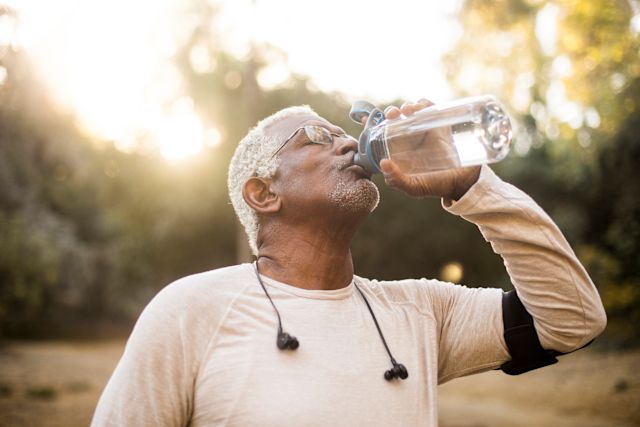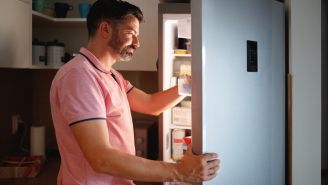Updated on October 14, 2024.
If you associate dehydration with sky-high summer temperatures and sweaty workouts, you’ve got the right idea. Hot weather and exercise certainly call for drinking plenty of water. But preventing dehydration involves more than taking a few sips of water after a day in the sun or an intense workout.
When learning how to prevent dehydration, it can be helpful to understand the various factors that can lead to fluid loss.
What is dehydration?
Water makes up 55 to 65 percent of the human body. It facilitates several vital functions, including:
- Flushing out toxins and waste products
- Delivering oxygen and nutrients to cells
- Lubricating joints
- Helping the body absorb nutrients and minerals
- Moistening tissues in the mouth, nose, eyes, and other organs
- Controlling body temperature
Simply put, your body needs water to survive.
Dehydration happens when your body loses more water than it takes in. While the body can generally tolerate a water loss of 1 to 2 percent, any further disruption in water balance can result in dehydration symptoms.
What causes dehydration?
Some of the most common causes of dehydration include:
- Not drinking enough water
- Heavy sweating from factors like physical activity and time spent in hot, humid weather
- Frequent urination
- Fever
- Vomiting
- Diarrhea
How can I tell if I’m dehydrated?
Are you thirsty? If so, you’re likely already dehydrated. In addition to lingering thirst, other signs of mild to moderate dehydration in adults include:
- Fatigue
- Dizziness
- Reduced sweating
- Reduced urination
- Dark-colored urine
- Dry mouth
- Headache
- Constipation
- Muscle cramps
Signs of dehydration in babies and young children may involve:
- Crying without tears
- Dry mouth and tongue
- A dry diaper for three or more hours
- Eyes and cheeks that appear sunken
- Unusual irritability, fussiness, or listlessness
In severe dehydration, thirst may actually decrease. This decreased thirst might be accompanied by confusion, lightheadedness, or fainting. If left untreated, severe dehydration can cause dangerous complications like shock (an unhealthy drop in blood pressure), organ damage, coma, and even death.
When to seek medical care for dehydration
Many cases of mild to moderate dehydration can be reversed by simply drinking more water and getting some rest. Still, some people who are dehydrated require medical care. Promptly visit a healthcare provider (HCP) if you or someone around you:
- Experiences diarrhea or vomiting for more than 24 hours
- Can’t drink fluid without vomiting
- Has stool (poop) that’s bloody or black
- Experiences signs of severe dehydration, including fainting, confusion, or disorientation
Who is at risk of dehydration?
Anyone can become dehydrated, but some people have a higher risk of experiencing dehydration than others. These groups include:
- People who work outdoors, such as construction workers and landscapers
- Infants and children, who are more likely than most adults to experience fevers, diarrhea, and vomiting, which may cause dehydration
- People with chronic (long-term) illnesses, such as kidney disease and diabetes
- Athletes and people who exercise frequently, especially those who play sports or exercise outdoors
- People who take medications that increase urination; these include diuretics that help treat high blood pressure and heart disease, and lithium to help manage bipolar disorder
- Older adults, who typically sense thirst more slowly than younger people (this is especially true for older adults with neurodegenerative conditions like Alzheimer’s disease and Parkinson’s disease)
How can I prevent dehydration?
Maintaining a healthy water balance and preventing dehydration involves following certain steps, including the following:
Drink plenty of fluids
Drinking enough water keeps you hydrated and prevents dehydration. This may seem obvious, but you may be wondering how much water is enough? The answer isn’t so simple.
While many professionals encourage adults to drink at least eight glasses of water daily, there’s no magic number that will prevent dehydration for everyone. How much water you need to drink to stay hydrated will depend on factors like your physical activity levels, your overall health, what type of climate you live in, and how much time you spend outdoors.
As a rule of thumb, you should drink enough water to avoid feeling thirsty and to keep your urine color light (think the color of lemonade or lighter). Urine that looks more like apple juice or cola could signal dehydration.
Drink more water before and after you exercise or spend time outdoors. You should also try to drink extra when you’re sick (if possible), especially if you’re vomiting or having diarrhea. Don’t attempt to gulp down multiple glasses of water at a time. Instead, sip water slowly and comfortably.
Try these simple tips to help you drink more water throughout your day and prevent dehydration:
- Order water when eating out at restaurants rather than sodas or alcoholic beverages (you’ll save some money, too)
- Carry along a reusable water bottle (preferably metal or glass) as you run errands, attend school, or go to work
- Fill up freezer-safe water bottles and keep them in the freezer to enjoy on a hot day
- Give plain water more flavor by adding in some basil, mint, sliced strawberries, or wedges of lemon or lime
When it comes to preventing dehydration, drinking plain water is best. In some cases, electrolyte beverages (like Pedialyte or certain sports drinks) can be a helpful fluid replacement option for people who have lost a lot of water through sweat, fever, diarrhea, or vomiting.
Electrolytes are essential minerals (such as potassium, sodium, and calcium) that help you stay hydrated and keep your fluid levels in balance. You lose electrolytes when you sweat, go to the bathroom, and vomit. Electrolyte replacement drinks and sports drinks can help you rehydrate after a sweaty workout or illness. Just make sure you avoid sports drinks that are loaded with sugar or caffeine, which can actually make dehydration worse.
Can you drink too much water?
It’s uncommon, but it is possible to drink too much water and become overhydrated. The Centers for Disease Control and Prevention (CDC) advises people to avoid drinking more than 48 ounces of water or electrolyte beverages per hour (that’s around one and a half quarts). Too much fluid can dilute the concentration of salt in the blood and cause a medical emergency called hyponatremia.
Snack on foods with high water content
Certain foods can help you replace fluids and prevent dehydration. These include fruits and vegetables that contain mostly water. Examples of nutritious foods with high water content include:
- Watermelon
- Celery
- Spinach
- Cucumbers
- Tomatoes
- Strawberries
- Broccoli
- Apples
- Oranges
- Cantaloupe
- Carrots
- Grapes
Limit dehydrating beverages and foods
Not all drinks are hydrating. Certain beverages and foods can increase your risk of dehydration and make it harder to keep a healthy water balance on dry, hot days. These beverages and foods include:
- Alcohol
- Caffeinated beverages, including coffee and energy drinks
- Sugar, including sugary drinks and foods with added sugars
Be mindful of how much alcohol, caffeine, and sugar you consume, especially if it’s hot outside or you’ve lost fluids from an illness or workout. Sipping water alongside your morning coffee or an alcoholic beverage can help lower your risk of dehydration. Limiting your consumption of alcohol, caffeine, and sugar also offers several benefits for your overall health.
When it comes to alcohol, that means limiting your intake to no more than two drinks per day for men and people assigned male at birth, one per day for women and people assigned female at birth.







